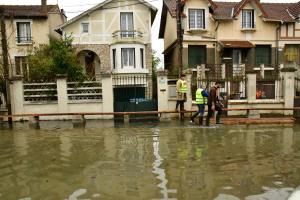In the pan-European region, citizens are feeling the impacts of climate change through extreme weather events. This undermines equitable access to water and sanitation as human rights, due to increasing water scarcity and increased burden of water diseases due to overflow of untreated sewerage caused by flash floods.
According to the World Meteorological Organization, almost half of the global population live in areas that suffer from water scarcity for at least one month every year and 1.81 billion people are directly exposed to a 1-in-100-year flood, out of which several are located in the pan-European region.
As the frequency of climate-induced extreme weather events is increasing, pan-European countries took stock and identified key directions and priority actions at a Strategic Roundtable on Increasing Resilience to Climate Change in the Water and Sanitation Sector (Geneva, 13-14 November 2023) convened under the UNECE-WHO/Europe Protocol on Water and Health and led by Italy and the Netherlands.
This comes at a crucial time as governments prepare for COP 28, and after COP 27 emphasized and urged Parties to integrate the protection and restoration of water and water-related ecosystems into their adaptation efforts.
H.E. Mr Paul Bekkers, Ambassador of the Kingdom of the Netherlands, emphasized the threats derived from a higher frequency of extreme weather events: "Shifts in rainfall patterns and a heightened frequency of drought events as a result of climate change can, unfortunately, result in the spread of infectious diseases, impacts on mental health or setbacks in the pursuit of equitable access to safe water and sanitation".
The Strategic Roundtable allowed over a hundred government representatives and experts responsible for health, environment and climate to exchange good practices and identify key needs across sectors. The urgency of breaking siloes and acting as one was highlighted by H.E. Vincenzo Grassi, Ambassador of Italy: "As already expressed in the United Nations 2023 Water Conference, we believe it is essential to frame our countries' commitment under the international aegis of the Water Action Agenda and the Protocol on Water and Health".
Participants stressed the need for convening multi-stakeholder and cross-sectoral dialogues on the interface of climate, water and the environment and highlighted the usefulness of the Protocol platform to gather actors from water, climate, health, and finance sectors and to involve other national, regional and local actors such as water regulators and water and wastewater operators to ensure coherence with national adaptation measures.
Discussions also stressed the need to develop targeted guidance documents to increase resilience to climate change in the water and sanitation sector. Dmitry Mariyasin, Deputy Executive Secretary of UNECE, emphasized the importance of the Protocol in identifying strategic directions and priorities in the pan-European region to develop the required tools for country-level action.
Participants also discussed how the Protocol's mandatory target-setting mechanism can serve as an effective tool for mainstreaming adaptation to climate change. To date, several Parties, such as Luxembourg, Norway, Portugal, the Republic of Moldova and others, have set climate-sensitive targets on water and sanitation to ensure the presence of collective system operators capable of responding at the regional level to mitigate the effects of extreme weather conditions and serious emergencies.


